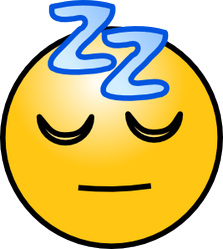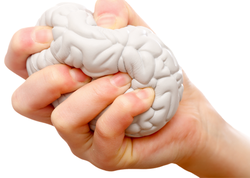How Much Sleep Does an Adult Need?
Adults
Adults need 7-9 hours of sleep. Just 2 bad nights of sleep a week can increase an adult's heart rate, blood pressure, and inflammation in the body. It can also increase appetite. According to some estimates, 90% of adults with insomnia also have another health condition.
Sleep disorders and chronic sleep loss can put you at risk for:
- Heart disease
- Heart attack
- Heart failure
- Irregular heartbeat
- High blood pressure
- Stroke
- Diabetes
How Much Sleep Children Need
Is your child cranky thoughout the day? Are they having trouble waking up in the mornings or trouble falling asleep? If the answer is yes, they may need more sleep. How much sleep a child needs depends on the age of the child. A newborn needs more sleep than a schoolaged child.
Newborns - Newborns need about 12-18 hours of sleep. Newborns should be awaken every 3-5 hours until their weight gain is established, which usually happens within the first couple weeks. After that, an infant may sleep 4-5 hours at a time. After about 4-5 hours they wake because they are hungry.
Infants - Infants need about 14-15 hours of sleep, including naps. Human growth hormone, which spurs body and brain development, is secreted during certain stages of sleep, so growth can be stunted in babies that don't get enough sleep.
Toddlers - Toddlers need about 10-14 hours of sleep, including naps. From ages 1-3, most toddlers sleep about 10-13 hours.
Preschoolers - Preschoolers need about 10-12 hours of sleep, including naps. Lack of sleep in children under 5 has been linked to obesity later in life.
Schoolage Kids - Schoolage children need about 10-11 hours of sleep. Inadequeate amounts of sleep for schoolaged children can lead to hyperactivity, learning problems, and behavioral problems in schoolage children.
Teens and preteens - Teens and preteens need about 81/2-91/2 hours of sleep. Lack of sleep for teens can lead to depression, attention problems, inconsistent performance, delayed response time, poor grades and problems in school.
Sleep Products From Amazon
 |  |  |
| Beyond Down Gel Fiber Body Pillow Sleep Better | 500 Thread Count 750 Fill Power Egypt... | The Harvard Medical School Guide to a... McGraw-Hill |
Possible Side Effects From Lack Of Sleep
- Dizziness
- Nausea
- Headaches
- Irritability
- Muscle pains
- Increased risk of heart disease
- Increased risk of high blood pressure
- Increase risk of diabetes
- Slowed healing
On average, how many hours do you sleep a night?
Tips For Falling Asleep Faster
- Avoid caffeine throughout the day.
- Avoid exercise 4 hours before sleep.
- Don't eat a heavy meal before sleep.
- Avoid long afternoon naps.
- Sleep with the light and TV off.
- Take a warm bath to relieve stress and calm you.
- Follow an evening routine by going to bed at the same time every night. Routines are good because they tell your body to it time to wind down and expect sleep soon.
- Don't smoke before bedtime. Nicotine is a stimulant.
Reduce your stress! One of the main causes of lack of sleep is stress, which can be caused by work family, financial matters and personal issues. Make a commitment to yourself to clear your mind of all worries and stress at least 1 hours before going to sleep. If start to think about your stress once you go to bed, think about something else to take your mind off it. Think about happy things or try counting, starting at 100 and going backwards. You will probably fall asleep before you reach number 1.
You might also like
How to Lower Cortisol Levels Reduce Stress Hormone and Improve...Cortisol is a steroid hormone regulating metabolism, the immune system and ai...
Walking Your Way to HealthThere is much research that shows that walking is beneficial to body and mind.




 Pool Safetyon 06/18/2011
Pool Safetyon 06/18/2011
 Symptoms of Stresson 06/17/2011
Symptoms of Stresson 06/17/2011
 Livescribe Echo Smartpenon 06/14/2011
Livescribe Echo Smartpenon 06/14/2011
 Homemade Octo Mom Costumeson 06/14/2011
Homemade Octo Mom Costumeson 06/14/2011


Comments
makes me hungry! thats interesting! but sleep with the nightlight off???? lions and tigers and bears!!! :)
Thanks for stopping by Ron.
Some great hints - it's interesting that simple things like getting the right amount of sleep and drinking water can reduce your appetite and thus help you to lose weight. I must get more sleep and drink more water! It's fascinating to see the different amounts of sleep that we need depending on our age.
I had no idea that a lack of sleep could increase hunger - that's a really interesting thought.
I do like my sleep. Getting woken up in the night was the hardest part of having babies! Luckily both kids now love their sleep too.
I've never been able to survive on 7-9 hours of sleep. I need my 10-12 hours otherwise I need a daytime nap! My daughter, on the other hand, has easily done 10 hours a night and a half hour day time nap since about 9 months of age.
I know one thing for sure: Web developers need by far more sleep, than they get *lol*
Thanks for the iteresting article!